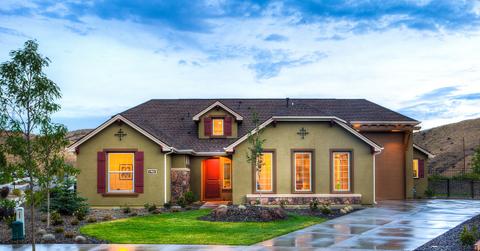This Neighborhood Turned Each Home Into Its Own Green Power Plant
A neighborhood of 16 homes and residential properties are going to be connected to each other in the United Kingdom. They'll be sharing electricity generated from solar power and stored in batteries, creating less need for power plants.
Updated May 21 2019, 2:49 p.m. ET
In the future, we could rely a whole lot less on large-scale power plants if we were able to generate energy in our own homes. How realistic is this? Interestingly, it's not a distant daydream. In fact, a town in the United Kingdom is already exploring the possibility of a neighborhood connecting and sharing their own electricity right from home.
Of course, some eco-friendly solutions already exist when it comes to tacking on solar panels and installing battery backups, but for people who live entirely off the grid, these options aren't super viable. While in theory, your home could receive enough energy from the sun's rays to allow you to live with little or no aid from an electric company, the fact of the matter is, sunlight is inconsistent, and the efficiency of solar cells varies by the day, creating an inconsistent energy supply.
This is exactly why the town of Neath in Wales is exploring a middle ground. Houses would be connected as a neighborhood to generate their own green energy. Essentially, these houses would become their own power plants, shifting electricity around with shared battery storage. 16 houses and residential buildings, all varied in size from a one-bedroom apartment to a three-bedroom house, will be tested in the new housing at Neath.
The group behind this push of transitioning buildings to become their own power stations is the Sustainable Product Engineering Centre for Innovative Functional Industrial Coatings, or SPECIFIC. Its project that was launched at Swansea University back in October 2012. Over time, they’ve been able to add partners and receive funding to continue pushing their goal. By eliminating power stations, that could save a lot of money in the long run.
“You would reduce the need for central energy generating stations by around three gigawatts, which is equivalent to a large nuclear power station,” Kevin Bygate, CEO of SPECIFIC, told Fast Company. “If you [construct buildings] in a smart way and they’re energy positive, then actually you reduce the demand for central power stations. That’s worth at least £11 billion [$14 billion] in the U.K., and maybe more.”
SPECIFIC will be teaming up with the Pobl Group to construct the new houses. With the added technology of generating, storing, and distributing energy to other homes, these buildings will be up to 20 percent more expensive to construct. However, immediate results will be shown in the energy savings, shaving hundreds of dollars per year based on electricity needs.
Bygate believes that homegrown energy is more reliable than leaning on other sources, even renewable options like offshore wind power. As testing is done with electric networking, these buildings will still be attached to the grid. Cooler weather will require heating, which would be tapping further into the network. However, as technology gets cheaper and solar cells become more efficient, a complete disconnect could be feasible in the future.
There are hopes of creating this networking on a larger scale after further studies are done in Neath. Costs will continue to come down and even the initial benefits are enough to make the option attractive, especially when this process can be wired into existing homes. Of course, there’s many concerns about distribution among the buildings and how this network can handle varying degrees of usage. It’ll be interesting to see how this neighborhood that will be powering itself turns out.
